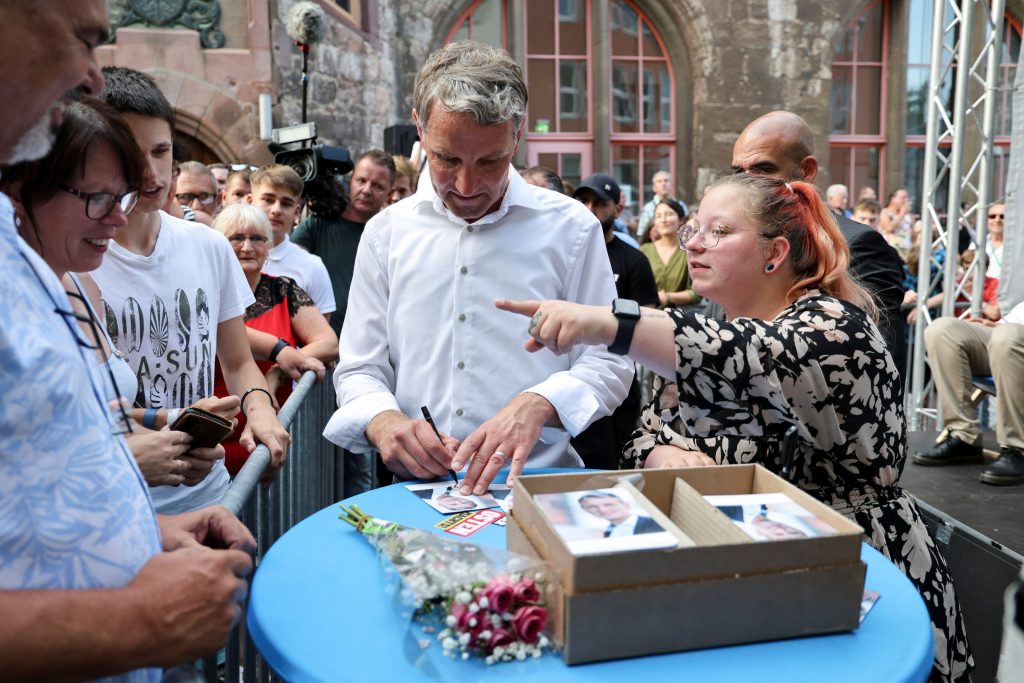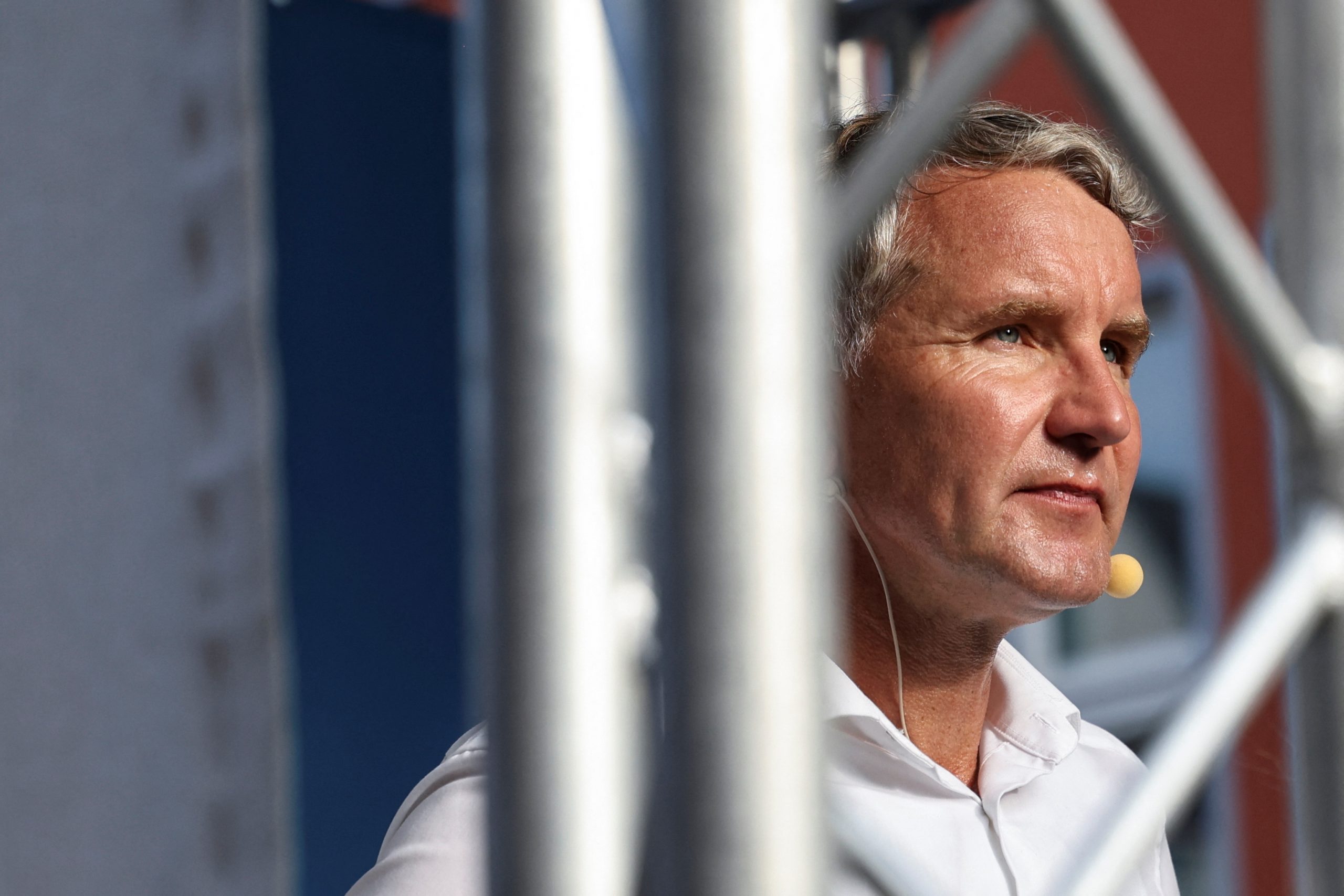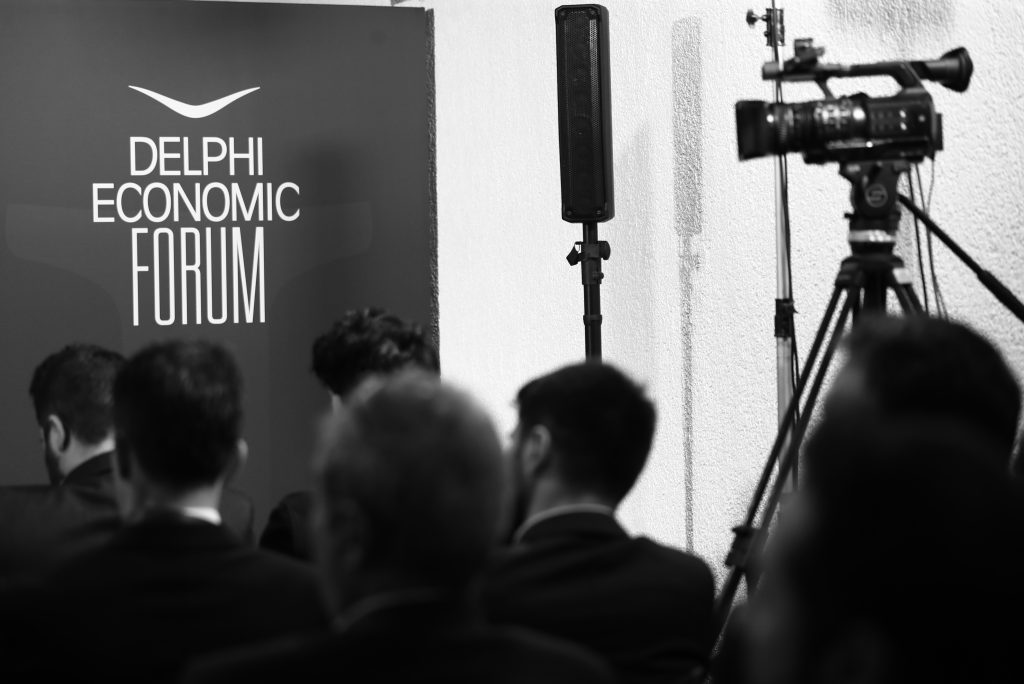BERLIN—Since the end of World War II, the birthplace of Nazism has kept far-right forces out of power. A former high-school teacher who has never held political office is hoping to change that.
Björn Höcke, the firebrand head of the AfD party in the eastern German state of Thuringia, is leading ahead of a Sept. 1 regional ballot, according to an Aug. 13 survey by the INSA polling group. This puts a man who once said it was problematic to represent Hitler as “absolutely evil” in pole position to be the first postwar far-right politician to win a German state election.
Even if he doesn’t end up governing, a ballot win would make history in Germany. Crowning one of Europe’s most hard-line far-right groups would also mark an inflection point for a region where right-wing parties have found success by sanding down their ideological edges.
“It would be a turning point for sure, an earthquake,” said Axel Salheiser, scientific director of the Institute for Democracy and Civil Society in Jena, Thuringia’s second-largest city. “It would be highly symbolic for a far-right party to win, here of all places, in former East Germany, where the experience of dictatorship stretches across the 20th century.”
Thuringia is one of three eastern German states holding elections in September, out of a total of 16 states in the country. Most polls have shown the AfD leading in all three throughout the summer, with Höcke holding the biggest lead—nine points ahead of the conservative Christian Democratic Union, according to INSA. The AfD would be hard pressed to replicate that sort of success at a national level, where scandals have softened its ratings .
In rallies around Thuringia billed as “family parties,” Höcke has projected a smiling, positive mood. Physically, the trim, gray-haired but youthful-looking 52-year-old father of four cuts an unthreatening, even friendly figure.
After a rally this month on the picturesque market square of Apolda, a midsize town in northern Thuringia, a smiling Höcke, wearing jeans and an open shirt despite the rain, signed photographs, shook hands and shared hugs with supporters, one of whom had brought handmade cookies.
His speech earlier had a harder edge. After calling German reunification an experiment “to transform a monocultural society into a multicultural society,” he said: “I’m asking myself, were we ever asked if we wanted to become multicultural?…No, we weren’t, and that is why that multicultural experiment will end in Thuringia on Sept. 1.”

Bjoern Hoecke, leader of the Alternative for Germany in Thuringia (AfD), signs a picture on the day of his election campaign rally for the Thuringia state elections in Nordhausen, Germany, August 29, 2024. REUTERS/Karina Hessland
The AfD’s anti-immigration message could get a boost after a terrorist attack left three dead in the western city of Solingen on Friday and police later detained a Syrian suspect. Before the arrest, Höcke posted a video of the attack’s aftermath on X, asking: “Do you really want to get used to this?”
The grandson of refugees expelled from lost German territories after the war, Höcke was born and raised in western Germany. A history and sports teacher, he joined the AfD shortly after its creation in 2013 and created the party’s Thuringian chapter, soon turning it into a bastion of the AfD’s right wing.
Besides immigration, a recurrent theme has been his frustration with Germany’s culture of remembrance. In a 2017 speech about Berlin’s sprawling Holocaust memorial, he said, “We Germans are the only people in the world who’ve planted a monument of shame at the heart of their capital.” That year, he told The Wall Street Journal that “the big problem is that one presents Hitler as absolutely evil.”
In 2019, a court sided with demonstrators who had called Höcke a fascist, saying the label wasn’t defamatory but rested on “a verifiable factual basis.”
The AfD as a whole remains a relatively broad church, home to conservatives as well as nationalists and nativist militants. But Germany’s domestic intelligence agency has labeled the Thuringian branch an extreme-right organization because it says its positions are “against human dignity, democracy and the rule of law.”
The designation allows the agency to covertly monitor Thuringian AfD leaders’ communications, for instance, which Höcke and colleagues have denounced as violating their rights.
What distinguishes Höcke in the AfD isn’t just his positions but also the breadth of his audience, said Manès Weisskircher, political scientist at the Dresden University of Technology. He appeals to right-wing intellectuals but also street protesters and civil-society groups outside the party, Weisskircher said.
In two separate trials this year, a court found Höcke guilty of twice knowingly using in speeches the phrase “Everything for Germany.” The motto was engraved on the daggers of the SA, the Nazi Party’s paramilitary wing, and is a banned Nazi slogan under German law.
Höcke denied any knowledge of the quote’s background. Before the first trial, he wrote on X that he was being persecuted because he had “expressed my patriotism ‘incorrectly.’” The tweet prompted Elon Musk to ask, “What did you say?” and later, “Why is that illegal?”
While he never served in the AfD’s central executive bodies, Höcke and his supporters eventually emerged as victors from a string of internecine conflicts that led to the exile of most prominent members of the party’s moderate wing. Jörg Meuthen , a former AfD chairman who left in 2022, said in a TV documentary this year that he regretted opposing a 2017 initiative to expel Höcke.

A person wears a pin in support of Bjoern Hoecke, leader of the Alternative for Germany in Thuringia (AfD), during an election campaign rally for the Thuringia state elections in Nordhausen, Germany, August 29, 2024. REUTERS/Karina Hessland
“Fundamentally, I find the goals that Höcke and his people are pursuing clearly dangerous for democracy,” Meuthen told public-sector broadcasters NDR and WDR. Höcke’s chief of staff, Robert Teske , said in an email that “our country has bigger problems than the comments of a former party chairman.”
In recent years, Höcke has reached something of an uneasy truce with the AfD’s national leadership, who treat him as an irritant who shouldn’t be alienated because of his clout in the party’s eastern strongholds.
“He is very popular in the East, he comes across well. I noticed that when attending events with him,” Alice Weidel , AfD co-chairwoman, said in May. “Höcke represents a certain political current in the party and we have to acknowledge that.”
Höcke declined to be interviewed for this article, but Stefan Möller, his No. 2 and a co-chairman of the Thuringian AfD, said: “Yes, there were situations when [Höcke] used provocation, including in his political communication, as a way to shake up the discourse. But that was a long time ago. Today he’s more concerned about avoiding such provocations.”
Even if the AfD wins the biggest share of the votes in Thuringia, Höcke still faces formidable hurdles to becoming governor. With no prospect of gathering more than 50% of the votes, he would need a coalition partner and no other party has so far been willing to engage.
“I’m no oracle,” said Salheiser, the director of the Jena-based institute, “but I’m assuming that regardless of its share of the vote and how many parliamentary seats it gets, the AfD won’t be part of the next government.”
Möller disagreed, saying the party has substantial political overlap with the center-right CDU and that Höcke could also join with the BSW, a new left-wing populist party whose Russia-friendly and populist positions often echo the AfD’s. The BSW is polling at 18% to the AfD’s 30% in the state, according to polling group Forsa, suggesting the two could garner a majority.
Asked whether a victory in Thuringia might fire up Höcke’s national ambitions, Möller said: “We can be a positive role model here, including for other states, other AfD chapters…What works well in Thuringia might also work well elsewhere.”
Write to Bertrand Benoit at bertrand.benoit@wsj.com



